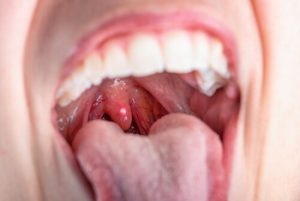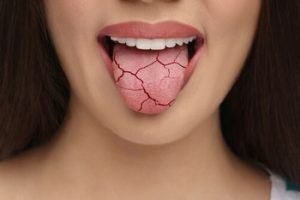Ever woken up with a parched mouth, lips sticking together, or a strange dry feeling that just won’t go away? You might be dealing with something called xerostomia, known as dry mouth. It’s more than just occasional thirst; it can be a sign that your body isn’t producing enough saliva to keep your mouth moist, and it may lead to other oral health problems if ignored. A dental check up can help identify the cause early and guide you toward effective solutions.
Let’s take a closer look at dry mouth symptoms, what causes them, and the dry mouth treatment options available to help you feel more comfortable and keep your smile healthy.
What Is Dry Mouth and Why Does It Happen?
A dry mouth happens when your salivary glands do not produce enough saliva to keep your mouth moist. Saliva is more important than many people realise. It helps with chewing and swallowing, breaks down food, neutralises acids, and washes away food particles. It also protects your teeth from tooth decay and your gums from disease.
There are many things that can cause dry mouth, from certain medical conditions and medications to lifestyle habits. Determining what’s causing the problem is the first step toward choosing the most effective treatment.
Recognising the Symptoms of Dry Mouth
Dry mouth symptoms can vary from slight discomfort to significantly affecting your daily life. Here are some common signs to look out for:
- A sticky or dry feeling in your mouth and throat
- Difficulty chewing and swallowing food
- A dry tongue that may appear rough or swollen
- Cracked lips or splits in the corners of your mouth
- Mouth sores or ulcers inside the inner cheeks
- A burning sensation on the tongue or roof of the mouth
- Changes in taste or a metallic flavour
- Bad breath that persists
- Trouble speaking clearly
- A need to drink plenty of water, especially at night
- Difficulty wearing dentures due to a lack of moisture
If you notice several of these symptoms regularly, it’s worth seeing a dentist for a proper diagnosis.
Why Is Saliva So Important?
You might wonder, how much saliva do we actually need? On average, a healthy person produces between 0.5 to 1.5 litres of saliva per day. That might sound like a lot, but saliva helps in more ways than one.
It keeps the mouth moist, supports digestion, prevents tooth decay, fights gum disease, and keeps your tongue and inner cheeks lubricated. When your saliva production drops, the balance of your entire head and neck area can be affected.
What’s Really Behind That Dry Mouth? Common Causes You Should Know
A dry mouth may result from a temporary condition or indicate a deeper underlying health concern. Here are some common causes:
1. Medications
Hundreds of over-the-counter and prescription medications list dry mouth as a side effect. These include drugs for:
- High blood pressure
- Allergies
- Depression and anxiety
- Pain management
- Cold and flu
2. Health Conditions
Certain health conditions may also interfere with saliva production, including:
- Diabetes
- Parkinson’s disease
- Alzheimer’s disease
- Sjögren’s syndrome
- Stroke
3. Cancer Treatments
Radiation therapy to the head and neck can damage salivary glands, leading to reduced saliva flow. Similarly, chemotherapy can change the nature of your saliva, making your mouth dry or sticky.
4. Lifestyle Habits
Some lifestyle choices can also cause dry mouth:
- Smoking or chewing tobacco
- Drinking alcohol or soft drinks
- Consuming spicy foods or acidic foods
- Frequent mouth breathing
- Eating too many sugary or acidic foods
Complications of Dry Mouth If Left Untreated
Ignoring dry mouth might seem harmless at first, but over time, it can lead to:
- Increased risk of tooth decay
- Gum disease and inflammation
- Persistent bad breath
- Trouble digesting food properly
- Difficulty in wearing dentures comfortably
- Cracked lips and mouth sores
- Increased risk of oral infections like thrush
People who have undergone head and neck cancer treatments are particularly vulnerable to these complications due to compromised salivary glands.
Simple Ways to Keep Your Mouth Moist and Comfortable Throughout the Day
Thankfully, there are several simple things you can do to keep your mouth moist and relieve symptoms.
1. Chew Sugar-Free Gum
Chewing sugar free gum is one of the easiest and most effective ways to stimulate saliva production. It gives your salivary glands a gentle push and helps prevent food particles from lingering in your mouth. Look for gum with xylitol, which is good for your teeth too.
2. Stay Hydrated
Make sure to drink water consistently throughout the day, even if you’re not feeling thirsty. Taking small, frequent sips helps maintain moisture in your mouth.
3. Suck on Ice Cubes or Sugarless Lozenges
Slowly sucking on ice cubes or sugarless gum, or lozenges can soothe the mouth and encourage saliva flow.
4. Avoid Triggers
Reduce your intake of:
- Spicy foods
- Acidic foods
- Caffeinated beverages
- Alcohol
- Smoking and chewing tobacco
These can all worsen the dry sensation and irritate the soft tissues of the mouth.
5. Use a Humidifier
A bedroom humidifier can add moisture to the air, especially while you sleep. This helps combat mouth breathing, which often leads to a dry mouth by morning.
6. Try Artificial Saliva Products
There are over-the-counter products, such as artificial saliva sprays and gels, that can mimic the lubricating effect of natural saliva.
7. Maintain Good Oral Hygiene
Brush with fluoride toothpaste, floss daily, and see your dentist regularly. Saliva plays a role in self-cleaning your mouth, so when it’s lacking, extra care is needed to avoid tooth decay and gum disease.
When to See a Professional About Dry Mouth
If your dry mouth syndrome is ongoing, worsening, or accompanied by other unusual symptoms, it’s important to speak with a healthcare provider.
You may need to consult a dentist:
- To have an oral health assessment
- To review your medications or look into medical conditions
- To see if there’s concern about nerve damage or complications related to head and neck cancer
They may also recommend saliva tests or imaging to assess your salivary glands and determine the best course of dry mouth treatment.
Effective Dry Mouth Remedies You Can Discuss with Your Dentist
Your dentist may suggest:
- Prescription mouth rinses or gels
- Medications that help increase saliva production
- Custom trays to deliver fluoride treatments at home
- Specialised toothpaste and mouthwash for dry mouth
- Dietary advice to help avoid sugary or acidic foods
Together, you can create a personalised plan that addresses both the cause and symptoms, helping you regain comfort and protect your oral health.
Final Thoughts: Don’t Ignore the Signs of Dry Mouth
Whether your dry mouth is mild or making daily life more difficult, you don’t have to put up with it. Simple lifestyle changes, home remedies like chewing sugar-free gum, and appropriate treatment can make a world of difference.
The key is to stay mindful of your dry mouth symptoms and seek support early. A healthy mouth needs a good supply of saliva to do its job, and when that steady flow drops off, it deserves attention. Book an appointment with Available Dental Care today at (02) 4601 3828 to learn more.
Remember: Your mouth is one of the first indicators of your overall health. If something feels off, trust your instincts and talk to your dentist.
References
- Oral Health Foundation. (n.d.). Sugar-free chewing gum. https://www.dentalhealth.org/sugar-free-chewing-gum
- Cleveland Clinic. (n.d.). Dry mouth (xerostomia). https://my.clevelandclinic.org/health/diseases/10902-dry-mouth-xerostomia
- National Institute of Dental and Craniofacial Research. (n.d.). Tooth decay. https://www.nidcr.nih.gov/health-info/tooth-decay#:~:text=8%20%2D%20Related%20Publications-,Overview,infection%2C%20and%20even%20tooth%20loss.









